Qualified Testimonial Privilege for Physicians and Other Experts in Wisconsin
In Wisconsin, physicians, as well as others with expertise in their fields, enjoy a broad qualified privilege from being forced to give opinion testimony against their will. While they remain citizens with all the accompanying duties to give evidence of facts within their knowledge, they are under almost no obligation to tap into their medical expertise in matters that do not involve them directly. This privilege sets Wisconsin apart from most other jurisdiction and provides physicians here with some measure of protection against intrusions into their practice.
The privilege has been established and clarified in a trio of cases from the Wisconsin Supreme Court handed down within the past decade. The first of these cases, and the one that first clearly recognized the privilege is Burnett v. Alt, 224 Wis.2d 74, 589 N.W.2d 21 (1999). Based on this decision, the privilege is colloquially referred to as the «Alt privilege.»
The case itself involved the deposition of a physician who was present at a birth during which complications arose. He was asked about the significance of a particular event and declined to give his opinion. From this factual posture, the Court ultimately recognized the privilege for a physician to be free from having to give professional opinions unless certain conditions were met. Specifically, the Court ruled that absent a showing of exceptional circumstances, an expert cannot be compelled to give opinion testimony regardless of whether the inquiry seeks an existing opinion or whether it would require further work by the expert to arrive at an opinion. If a party can demonstrate a compelling need for the testimony, then that party must present a plan for reasonable compensation to the expert for presentation of his or her existing opinions. Under no circumstances can an expert be required to perform additional work to arrive at an opinion.
Of some interest is the Court’s basis for the opinion. The analysis is rooted in a Wisconsin statute, Wis. Stats. Sec 907.06, governing a court’s right to appoint an expert. Under that statute, a court cannot appoint a person to serve as an expert without their consent. The Alt court reasoned that private parties certainly have no greater rights than courts and therefore their ability to compel expert testimony must also be limited.
Alt left several questions unanswered and the Court next addressed the issue in Glenn v. Plante, 2004 WI 24. Glenn involved a treating physician who had been named as an expert by plaintiff’s counsel after some discussion with the physician. When it became clear to the physician the nature of what he was being asked to do, he declined. Plaintiff missed a deadline to name additional experts and when trial came he asserted that he had a compelling need for the physician’s expert testimony because without it, he had no expert and the case would be dismissed.
The trial court accepted this argument, but the Supreme Court reversed. The Court used the case as an opportunity to reaffirm the holding of Alt and give some guidance on the concept of compelling need. It noted that the physician’s expertise was not unique and more importantly, that procedural problems, especially those arising out of counsel’s dilatory prosecution of a case, did not constitute the type of compelling need that would force an expert to abandon his or her privilege.
The third case in the troika was Carney-Hayes v. Northwest Wisconsin Homecare, 2005 WI 118. While the Court again reaffirmed the Alt holding, it carved out an exception by creating a new category of witness. Witnesses who are also named parties to an action are now referred to as «Shurpit witnesses,» based on a 1966 case, Shurpit v. Brah 30 Wis. 2d 388. Under the Carney-Hayes holding, a Shurpit witness is required to answer standard of care questions put to them as it relates to their own care. Employees of an entity defendant, who are not specifically named as parties, retain their status as Alt witnesses. Additionally, Shurpit witnesses retain their Alt privilege with respect to the standard of care of other individuals.
While the cases summarized here are obviously more nuanced than what can be discussed in this context, there is general consensus on the following propositions. Experts can refuse to testify as to their opinions unless exceptional circumstances exist. Exceptional circumstances have not been defined but it is clear that this is a very high standard, which may or may not be able to be met. Notwithstanding the foregoing, any person possessing expertise can be compelled to give opinion testimony with respect to any aspect of their own actions involving their expertise.
If you have any questions concerning the practical applications of these principles, please feel free to give us a call.
To subscribe to email alerts from Axley Law Firm, click here.
